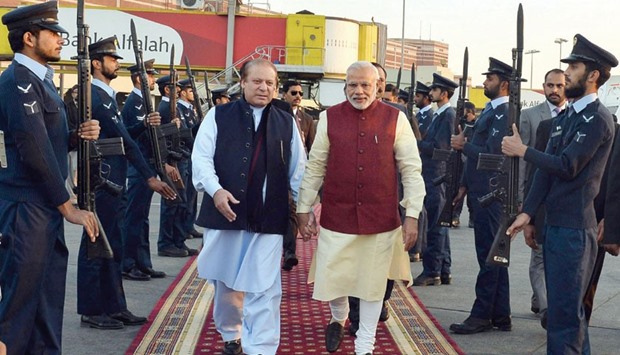The optics - hugs, hand-holding and hi-tea - were all fabulous; for substance, we’ll have to wait. After all, this is about the world’s most testing and testy bilaterals, whose pendulum swing impacts the fate of nearly one-fifth of humanity, to begin with.
About Lahore, it is famously said in local parlance: Jinne Lahore nai veykhia, o’ jammia-e nai (He who has not seen Lahore hasn’t even been born). Indian Prime Minister Narendra Modi was in the mood to set that record straight by pulling off, perhaps, the biggest coup of his one-and-a-half years in office when he dropped into Pakistan’s cultural capital on Friday afternoon to greet Prime Minister Nawaz Sharif on his birthday.
Just hours after tweeting the feel-good move whose reverberations could be felt across Pakistan, India and beyond, leading to a blanket media coverage in the two countries, Modi was personally welcomed at the Allama Iqbal International Airport by Sharif, who, then escorted him in a chopper - the first time the two leaders travelled together - to his Jati Umra residence before seeing him off two-and-a-half hours later.
All day speculation was rife about how the rendezvous materialised. The official version from Islamabad - enunciated by Foreign Office spokesman Aizaz Chaudhry - was that Modi phoned counterpart Sharif at 11:30am (PST) on Friday to greet him on his birthday and inquired about the possibility of dropping by in Lahore on his way back to New Delhi from Kabul where he had gone to inaugurate the new parliament building which India has gifted to Afghanistan.
Sharif is said to have welcomed him immediately, offering tea at home in Lahore where he was to celebrate the wedding of his granddaughter. Hours later, Modi had made it to Pakistan for the first time in his life, which also marked the first visit across the border by an Indian PM in more than a decade.
As some in the commentariat pointed out, it is quite unlikely the whirlwind visit had an impromptu mark, the official version notwithstanding - not in the least for the logistical nightmare such a high-profile landing would entail at such short notice.
A giveaway was the presence of Abdul Basit, Pakistan’s ambassador to India, who is reported to have been in Islamabad beforehand. It just may be that the eventual call had a slight element of surprise - or made to seem like one for some sort of mileage.
In this regard, it was interesting to note that steel magnate Sajjan Jindal, who, prominent Indian journalist Barkha Dutt claimed in her recent book This Unquiet Land - Stories from India’s Fault Lines, was the facilitator of a secret meeting between Modi and Sharif in his hotel room in Kathmandu when the two leaders attended the SAARC summit last year, was already in Lahore for the wedding of Sharif’s granddaughter!
Both New Delhi and Islamabad officially denied any secret meeting, if a touch half-heartedly, leaving Dutt, who has defended the claim all along, to suggest the arrangement had enough deniability quotient for the two leaders to lock heads away from the unforgiving media. She had a meal of a time on Friday conducting talk shows with an effusive ‘I-told-you-so’ cheek.
Whether Dutt’s claim is true or not, the media’s failure in India and Pakistan to have even got a whiff of what was cooking in the lead-up to Modi’s ‘surprise’ visit to Lahore, is proof that the two sides have wisely decided to get down to business away from its prying eyes as well as checkmating the usual suspects at home who have a vested interest in stonewalling peace.
Reportedly, the policy decision to keep aloof was taken ahead of the successful meeting of the two National Security Advisers, each of whom represents what are considered to be the major hawks in the peace process on either side, in Bangkok recently.
Reuters also reported the other day quoting unnamed sources that the thaw has been helped behind-the-scenes by the Pakistani security establishment. In a volatile region, particularly with regard to the situation in Afghanistan, Pakistan’s own fight against terrorism and the entire region’s uncompromised need to realise their respective economic goals, it makes sense to prioritise durable peace.
Comparatively speaking, Pakistan has momentum in its bid to revive the peace process as evident in the excited reaction to the Indian PM’s visit and the open expression of welcome from all the major opposition parties as well as the media. In contrast, the main Indian opposition Congress party as well as rightwing allies of the ruling Bharatiya Janata Party were quick to question Modi’s gesture in overly harsh terms. In kneejerk reaction, the media, too, initially sprang to tired diatribes.
However, the growing bonhomie between Modi and Sharif appears to suggest they may be preparing for the long haul: to pursue a mutually beneficial agenda in a peaceful neighbourhood. The dividends of peace, needless to say, far outweigh the cost of remaining locked in tattered history. Where Modi must be credited for realising, and hence, overturning a futile isolation-driven policy in the context of Pakistan, Sharif merits recognition for staying the course all along - even before he became prime minister a third time in 2013 - and subsequent spanner-in-the wheels as early as the UNGA summit three months ago.
Sometimes, symbolism takes on a whole new spirit and Christmas on Friday was spoilt with riches. It was also the birth anniversary of Pakistan’s founder Muhammad Ali Jinnah, who was famously dubbed the “Ambassador of Hindu-Muslim Unity” before Partition, as well as the birthday of Sharif and, Atal Behari Vajpayee, his first peace partner. Birthday cheer was just what the doctor ordered for the peoples of Pakistan and India!
* The writer is Features Editor.

Peace, piece by piece: Prime Minister Nawaz Sharif welcoming his counterpart Narendra Modi in Lahore on Friday.
